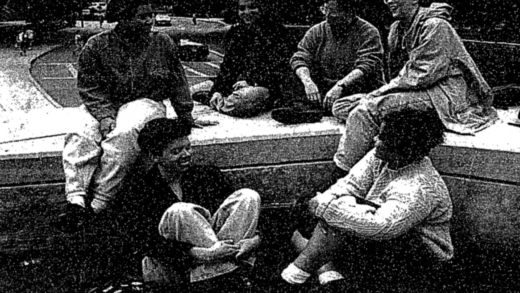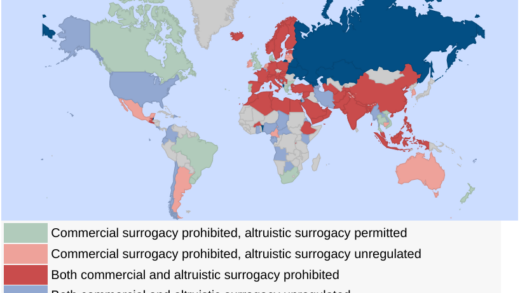by Aren Morrissey

Music is an indisputably important aspect of human existence. For as long as we have been on this Earth, humans have been using interments and their voices to express themselves and understand others. The overturning of Roe v. Wade sparked many musicians to produce songs about reproductive justice and gender inequality. Why were these songs created? Are they important? How has the history of activism affected what these songs sound like now?
Transcript – A Revolution Through Music
[Anonymous interview clips over intro music]
Could you tell me how you feel about the Supreme Court overturning Roe v. Wade?
Clip 1: I am eternally frustrated.
Clip 2: Really fucking angry.
Clip 3: Clarence Thomas should have taken John Oliver’s RV.
Clip 4: Why are we so old?
Clip 5: “Cabluey!”
Clip 6: Why the fuck is it their problem?
Clip 7: Really, really frustrated
[Transition music]
Hello and welcome to “A Revolution Through Music.” My name is Aren Morrissey, and I will be explaining how the rage we feel about the Dobbs ruling has been channeled into the music we enjoy.
[Transition music]
The overturning of Roe v. Wade has left people across the United States furious. An explosion of pro-choice protests and angry social media posts immediately followed the ruling as citizens realized its implications on the livelihood of AFAB individuals. On June 24, 2022, the Supreme Court voted to remove all federal protections on access to safe abortion care, effectively ruling that unborn fetuses deserve more rights than those who carry them. The relentless policing of AFAB bodies in recent years sets the dystopian precedent that violence against women, trans, and non-binary individuals is both expected and excusable in the United States. Since the summer of 2022, forty-one states have new restrictions on abortion, thirteen of which have a complete ban. Pro-life campaigners continue to instill fear and stigma around abortion in the states where it isn’t totally banned, now backed by the government. A feeling of despair haunts the reproductive rights movement at present as citizens hope their protests will compel politicians to finally fight for AFAB rights. In the throws of this hopelessness, many people, including myself, turned to music for consolation.
Music has always been a uniquely human method of conveying emotion from one group to another. This mode of self-expression has the ability to unite people in all facets of life. Music has also played a vital role in the success of activist movements throughout history. It’s been used to provide a creative outlet for expression against societal structures and ideals as well as an anthem for causes that get suppressed. Activist music validates individual feelings as widespread experiences and encourages us to keep fighting, even when there are countless obstacles. Support through music is particularly important for feminism as music has been one of few societally acceptable ways for women to freely express their rage.
The start of feminist music as a genre in the United States is largely attributed to the Women’s Suffrage Movement through the distribution of sheet music. Composed mostly of middle and upper class white women. Playing piano was a popular hobby among the suffragettes, so setting feminist rhetoric to simple tunes was a reliable way to spread their values and build a stronger community. After women got the right to vote, feminist music didn’t disappear: it transformed and evolved into a genre composed of many different styles and values through the decades. The evolution in feminist music can be seen in many popular songs. In the 1960s, American singer Lesley Gore preached female autonomy through her songs “You Don’t Own Me,” while rock ‘n’ roll singers such as Joan Jett sang about defying gender norms in songs like “Bad Reputation” in the 80s. Queen Latifah grew famous through her feminist hip hop pieces like “Ladies First” in the early 90s, and songs about politics and violence against women like “Rebel Girl” made punk Riot Grrrls groups popular in the late 90s and early 2000s.
Following the Dobbs ruling, artists across many genres, walks of life, and countries began responding to the announcement through their music. Indie musician Rio Romeo expresses their despair over the situation through their song “Fuck the Supreme Court.” They open the song by singing “They protect their houses, they protect their friends, they protect their wallets, but women is where it ends.” Romeo refers to the Supreme Court when they say “them” in this song, exposing the court’s often selfish motivations behind their decisions, thinking more of their own personal benefit than of how citizens will be affected by their actions. The pop singer Naïka displays disbelief and shock through her song “My Body, My Choice,” singing “One time, rewind, must have not heard this shit right/mind your business not mine, this is my body.”
Other artists focused more on using their anger to rile up others and instigate action. The song “BATTLEFIELD” by SkyDxddy points out the hypocrisy of personal firearms having more constitutional protections than AFAB people. She sings “AK47s, assault rifles, and a glock, all are more protected than a woman screaming ‘stop.’” Later in the song, she sings “Our mothers did not sacrifice their lives so we could die in some backalley abortion clinic you have been denied/they took away our rights when we had nothing more to take and they don’t give a fuck about all of the lives they put at stake.” These lines remind listeners of the long battle our elders fought in order to legalize abortion. We can’t stop campaigning for reproductive justice after this setback as bans on abortions will result in innumerable deaths.
In the UK, Delilah Bon writes about Dobbs as well, angrily singing “This is my body, my body is mine don’t belong to the government/this is my body, it’s mine to decide what the fuck I can do with it/this is my body, my right to decide is my right to my freedom.” in her popular song “Dead Men Don’t Rape.” She includes several lines about inclusivity in this song as well. She comments on how white women have historically dominated the reproductive rights movement, and envisions a movement where we “Stand with our sisters of every race.” When singing about this vision of the reproductive rights movement, Bon also says “Women, trans, non-binary, and people with uteruses will have the rights to their own bodies,” which I find extremely exciting as it is the only song about reproductive justice I’ve heard where cis-women aren’t the only people commented on. Intentionally writing inclusive lyrics in her songs shows a shift in the values the reproductive rights movement is promoting. The movement has started to transform into focusing more on the inclusivity of all people affected by Dobbs instead of helping only middle and upper class white women.
Many songs that had been released before the overturning of Roe v. Wade were re-released or gained new meaning in the current political climate in America. For example, Cyndi Lauper’s “Sally’s Pigeons,” a song about Lauper’s childhood friend dying from a back-alley abortion, was re-released as well as Loretta Lynn’s “The Pill” which is about gaining bodily autonomy with the abortion pill which gave her the ability to choose when, where, and with whom she has or does not have kids with. Many more songs, especially ones about violence against women, were also re-released. “Wolves” by Jensen McRae and “Not All Men” by Morgan St. Jean were two of the re-released songs frequently played following the Dobbs ruling. “Wolves” details three personal encounters with male violence, and “Not All Men” adresses the common deflection tactic of saying “not all men commit acts of violence against women” when people attempt to discuss widespread gendered violence. The re-released of songs about male violence depicts sexual violence as having a direct correlation to the illegalization of abortions, showing how Dobbs is actually impacting the well-being of AFAB people. While the songs responding to the overturning of Roe v. Wade are distinct from one another, they all work to unite listeners and build a community of shared values.
In the wake of the 2024 presidential election, reproductive rights are threatened more than ever. In concerts, the internationally famous English singer-songwriter Paris Paloma has begun encouraging her audience to “stand with their sisters in America” as they fight for their right to safe abortion before singing her most popular song “Labour.” By doing this, she changes her song from being about a singular abusive relationship to being about the treatment of AFAB people in the United States and beyond, belittled to being a: “24/7 baby machine so he can live out his picket fence dreams/it’s not an act of love if you make her, you make me do too much labour.” AFAB people are human beings deserving of the right to bodily autonomy just as AMAB people are. Revoking access to potentially life-saving care is a violation of human rights, and we will not stop fighting reproductive justice, and as long as people are fighting, music will be created to support the battle.
This has been “A Revolution Through Music.” Thank you for listening, have a great day and please stay safe.
[Outro music]
References
Bikini Kill. “Rebel Girl.” Track 10 Pussy Whipped. Kill Rock Stars, 1993.
Cyndi Lauper. “Sally’s Pigeons.” Track 6 Hat Full of Stars. Epic Records, 1993.
Delilah Bon. “Dead Men Don’t Rape.” Track 1 Dead Men Don’t Rape. Sentric, 2022.
Garcia, Erica Danielle. “A Brief History of Music and Feminism.” Amplify Her Voice, June 23, 2022. https://www.amplifyhervoice.org/blog/music-and-feminism.
“Home: Library of Congress.” The Library of Congress. Accessed November 14, 2024. https://www.loc.gov/.
Jensen McRae. “Wolves.” Track 8 Are You Happy Now?. ASCAP, 2022.
Joan Jett & the Blackhearts. “Bad Reputation.” Track 1 Bad Reputation. Boardwalk Records, 1980.
Loretta Lynn. “The Pill.” Track 1 Back to the Country. Wilburn Brothers Publishing Company, 1975.
Morgan St. Jean. “Not All Men” Track 6 Rich Man. Platinum Bleach Publishing, 2021.
“Music in the Women’s Suffrage Movement: Articles and Essays: Women’s Suffrage in Sheet Music: Digital Collections: Library of Congress.” The Library of Congress. Accessed November 14, 2024. https://www.loc.gov/collections/womens-suffrage-sheet-music/articles-and-essays/music-in-the-womens-suffrage-movement/.
Naïka. “My Body, My Choice.” Track 1 My Body, My Choice. Naïka, 2022.
O’Connor, Roisin. “A Complete Timeline of the Musicians Who Rejected Trump.” The Independent, November 1, 2024. https://www.the-independent.com/arts-entertainment/music/news/trump-musicians-taylor-swift-beyonce-harris-us-election-b2639679.html.
Paris Paloma. “Labour.” Track 5 Cacophony. Netwerk Music Group, 2024.
Powers, Ann, and Nisha Venkat. “Musicians React to Supreme Court Decision on Right to Abortion.” NPR, June 28, 2022. https://www.npr.org/2022/06/28/1107887181/musicians-react-to-roe-v-wade-decision.
Queen Latifah. “Ladies First.” 3 All Hail the Queen. Tommy Boy Records, 1989.
Rio Romeo. “Fuck the Supreme Court (Rant Song).” Track 1 Fuck the Supreme Court (Rant Song). Copyright Control Lyricists, 2022.
SkyDxddy. “BATTLEFIELD.” Track 1 BATTLEFIELD. Resurrected Records, 2022.
Yellowbrick. “The Power of Music in Political Activism.” Yellowbrick, August 18, 2023. https://www.yellowbrick.co/blog/music/the-power-of-music-in-political-activism#:~:text=Music%20as%20a%20Powerful%20Tool,issues%2C%20and%20advocating%20for%20justice.





